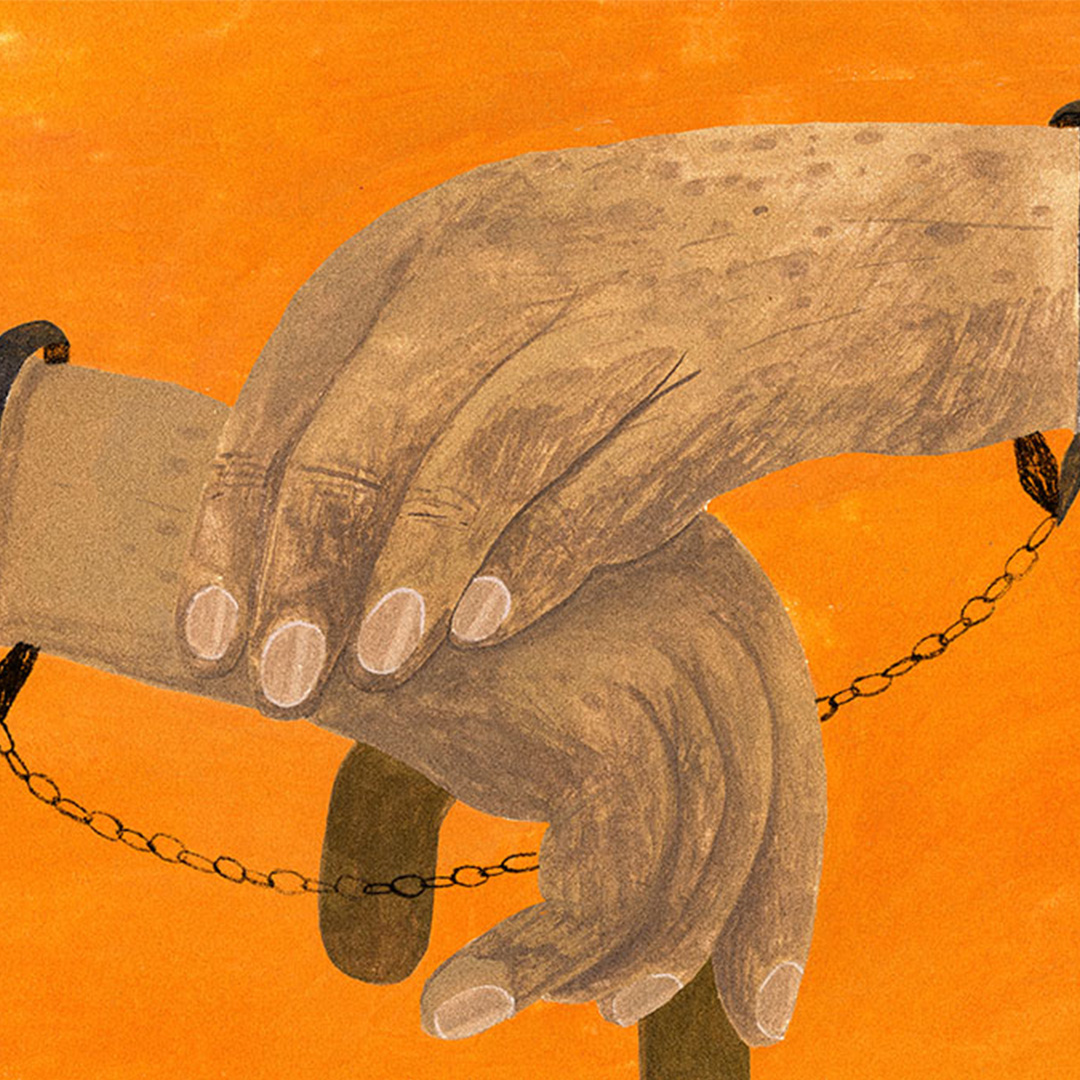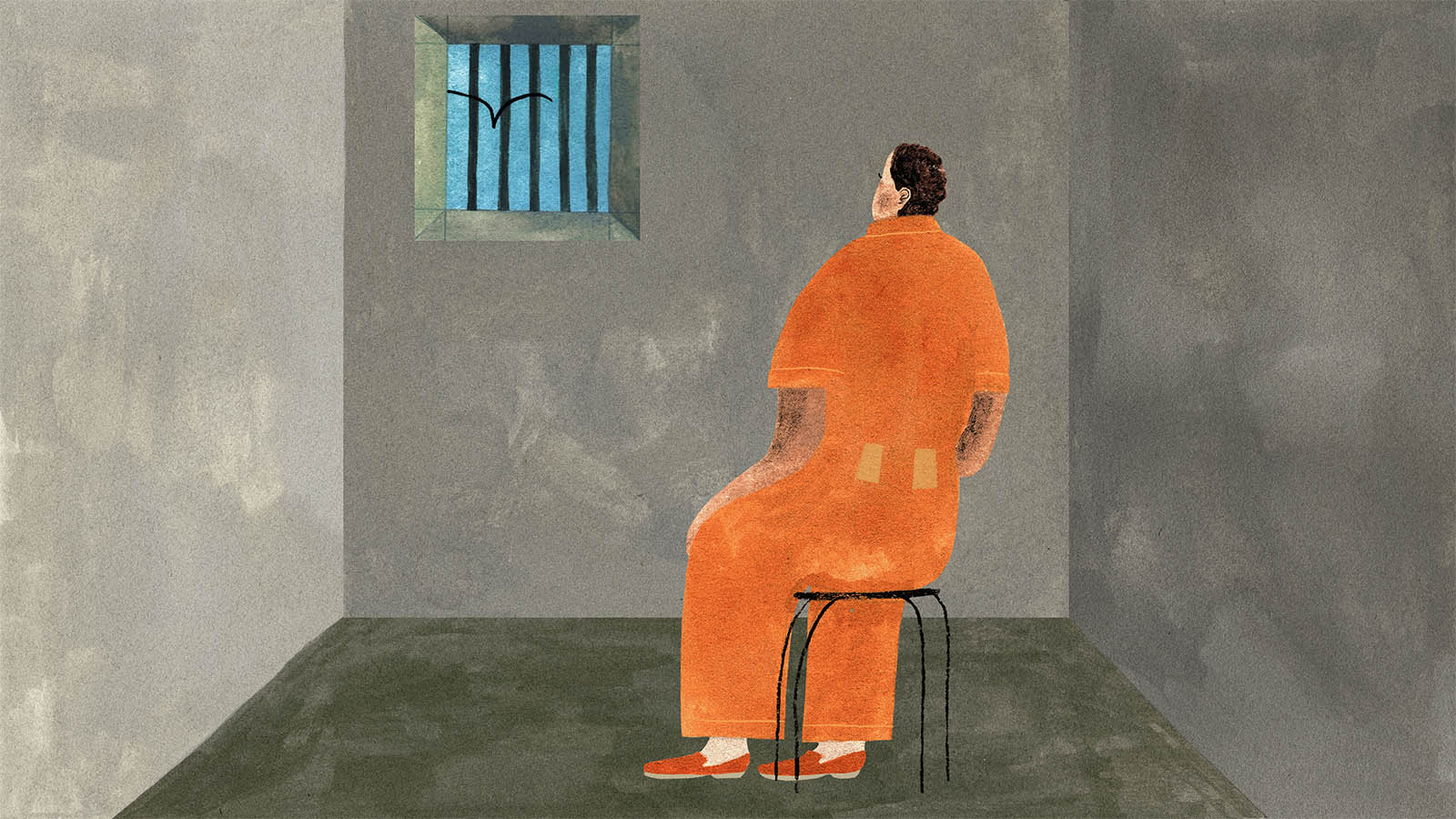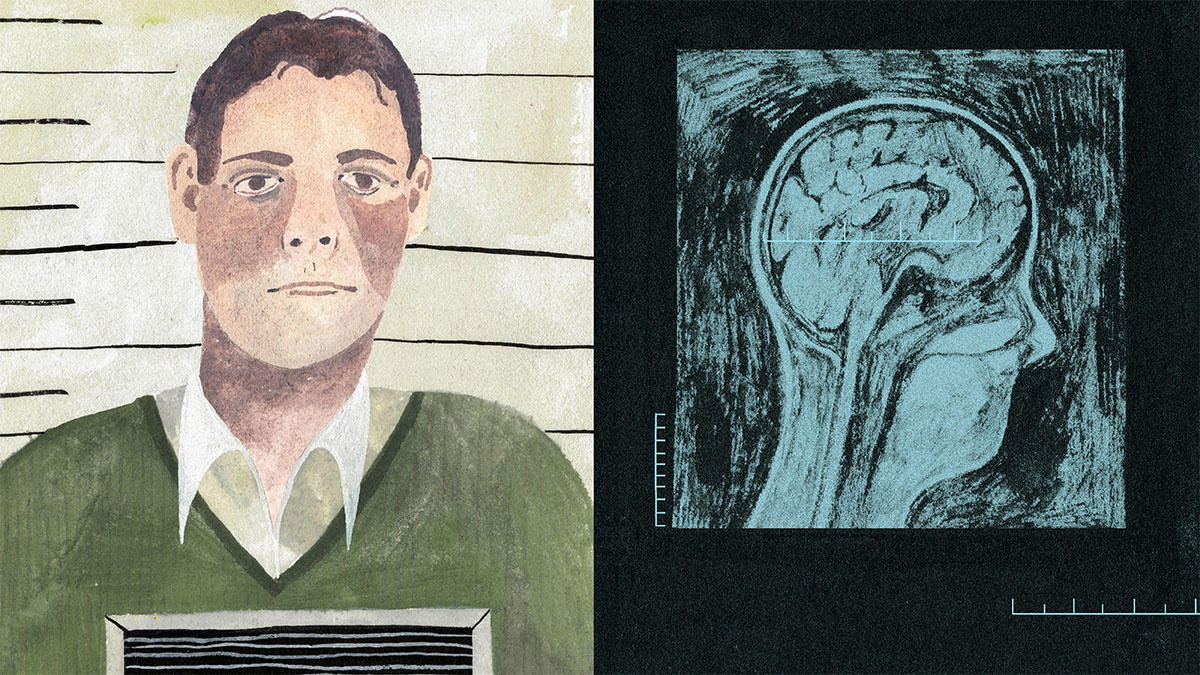

When Karen Murphy learned her father had dementia, she did everything she could. She went to the Alzheimer Society for advice. She wrote out his medications on a card and stuck it on her parents’ fridge. She paid a visit to the local police department in Sarnia, where he lived, and added his name to a list of the vulnerable—even gave them his photo and asked them to remember that, if he ever became violent, it was the disease talking and not the man. He’d been a mailman, the type to stop and chat, the type to hand out candies at the stores where he delivered. He was a gentle, lovable, huggable man and had never hit anyone, let alone his wife or his kids.
But the day he raised his hand against his wife, it was as though he didn’t know who he was. It was sundown, a time when many people with dementia get disoriented, even delusional. Murphy’s mother got scared. She called her two sons. She also called the police, and they got there first. Forewarned that the 83-year-old had dementia, they took him out of the house and had an ambulance transport him to a hospital.
Murphy knows a thing or two about mental health and the courts. She’s a Justice of the Peace in a Brampton courthouse. Before that, she’d driven prisoners to court in the paddy wagon and later became a court liaison officer. She’d served on several mental health committees. Over the years, she’d seen plenty of people just like her dad cycle through the justice system.
Ironically, an appointment had been scheduled for the very next day to see about getting him into a care home. “But once you call the police on someone,” says Murphy, “you find out that you can’t get them into a long-term care facility.” He was now labelled as violent, she says. No one would take him. Her mother never understood why, and the kids didn’t have the heart to tell her.
“I had identified as much as I could. I’d put in place what I could,” says Murphy. “But it still was not enough.”
More than half a million Canadians currently live with dementia according to the Alzheimer Society of Canada. The illness causes changes to the brain that affect behaviour and personality. Early on, it might cause them to be forgetful, and a little more irritable and anxious than they used to be. But, as the condition progresses, even mild-mannered individuals can become angry, agitated, and aggressive. Minor discomforts, like feeling cold or having a full bladder, become harder to express, and can lead to outbursts. Some people experience hallucinations and delusions. And some, like Murphy’s father, become violent, and law enforcement has to be called in.
Police in Ontario are required to lay charges in cases of domestic assault. Being arrested, charged, and cuffed is difficult in the best of circumstances. But when you are old, it is worse. When you are old and suffering from dementia, it is worse still.
Where an assault is less serious, such as “uttering a threat,” a court might agree to release a frail elderly person back to their home, says Shelly Schneider, who works for the Canadian Mental Health Association (CMHA), an advocacy group that, among other things, helps out in court in cases where the accused has mental health challenges. But in more serious cases, especially if someone was physically injured, that is not likely. “That person is going to be held for bail,” she says.
Increasingly, seniors are coming up against the law as a result of age-related illness, and our institutions are letting them down.
In Peel region, where Schneider works, the policy in most domestic violence cases is to arrest and hold. Sometimes, police can make an exception and release someone with dementia. But there will be strict conditions, like not going back to the family home and not contacting the person who was assaulted. Schneider says it breaks her heart to see an elderly person in court on charges, wanting to know where he is, asking when he can go home and where his wife is. The person he is now barred from contacting may be the only person in the world he still knows.
Often those terms of release are too complicated for a person with dementia to understand or remember, and that just makes things worse. If there’s no friend or family member who can take the person in and keep them secure—and often there isn’t—then the court has to come up with a plan. That can take days, sometimes many days. If a secure bed can’t be found anywhere, they might go to jail. The worse a person’s dementia is, the longer they may stay. “You have a gentleman in a cell, with bars in front of him,” says Schneider. “He doesn’t even know he’s in a jail cell.”
Long before her father had a diagnosis of dementia, Karen Murphy was already concerned about the struggles of people coming through the courts with mental health issues, addictions, developmental challenges, and dementia. She and others at the Brampton courthouse, including Justice Katherine McLeod, decided they needed a different kind of process to deal with these more delicate offenders.
So starting in 2002, for two half-days each week, the courthouse operated what they then called “mental health court” but now call “alternative resolution court.” They thought, “If we build it, they will come,” says Murphy, and they weren’t wrong. The court now sits every Tuesday and Thursday, all day. And if demand is any indication, it could sit every day.
“We are seeing more and more seniors coming into the system as a result of dementia, Alzheimers, or something as yet undiagnosed,” says Karen MacCallum, a police special constable who acts as a court liaison officer in the alternative resolution court.
The purpose of such courts is to recognize that the individuals behind the charges may have special circumstances. Instead of deterrence or punishment, these people need assistance. MacCallum says they try to identify candidates early in the apprehension process. Police officers are asked to flag any cases where they know of a diagnosis, so that they can be sent directly to “207,” as it’s known colloquially, after the actual courtroom number. 207 is more willing to explain things, more willing to answer questions, more willing to be patient.
It also makes sure there’s a doctor on site during the lunch hour. That doctor can help decide if a person should be assessed for fitness to stand trial. Does the person understand what is going on? What a judge does? How to give instructions to their lawyer? If not, based on an interview with the doctor, a judge may decide to send them to a forensic hospital for a full assessment.
The court also tries to connect people with services and resources that can help with their problem. From the beginning, for instance, the CMHA has been assisting in 207. Occasionally, they are able to provide what they call a “diversion,” where, in exchange for the promise of withdrawing charges, a person accepts several months of structured mental health support. The court is currently negotiating with the Alzheimer Society of Peel to create a similar diversion specifically for people with dementia.
The goal is for courts like these to take ill people out of the criminal justice system and put them into the health care system where they belong. In many instances, it manages to do exactly that. MacCallum recalls a gentleman in his eighties who’d been charged with threatening his wife. The following day, because of his dementia, he was brought straight to courtroom 207. He was promptly seen by the doctor and sent to a forensic hospital for assessment. Before his next scheduled court date even came around, says MacCallum, the hospital had notified the court that it had made a plan for his long-term care. The charges were withdrawn.
Even in the special courtroom, however, things don’t always turn out well. And in any case, not everyone in Peel with dementia even gets into 207. Maybe they don’t get flagged. Maybe it’s a Friday afternoon and, rather than hold them in a cell until Tuesday rolls around, they are brought through the regular court. Murphy is the JP in one such regular court, and she does her best to take good care of the fragile.
While a lot of places in the province have special mental health or addictions courts, especially larger centres like Toronto and Brampton, they may not all take people with age-related illness, says Schneider. And some places have no alternative courts at all. In those places, old people with dementia always have to navigate the regular court system.
Regardless of the courtroom, sometimes things just don’t go smoothly. Graham Webb, a lawyer with the Advocacy Centre for the Elderly (ACE), an organization that provides legal help to low-income seniors, recalls one such case. The family of the accused—an elderly man with dementia, charged with uttering threats to his wife—managed to get him into a regional hospital while they dealt with the charges. But the man found himself trapped there: the crown was unwilling to withdraw charges without a place for him to go and the care homes were unwilling to offer him a spot until the charges were withdrawn. It was a classic catch-22, and it took months to resolve.
“There are grounds for refusing admission to a long-term care home,” says Webb, but having a criminal charge outstanding against you is not one of them. “They do it anyway.” And the result, he says, is that many older adults who need care—sometimes the very ones who need it the most—end up being excluded from the long-term care system.
“The fundamental problem is there is a long waiting list for a behavioural support unit but there is no waiting list for jail.”
Assaults, sometimes even homicides, take place inside long-term care facilities too. In Ontario, these homes are required by law to have zero tolerance for abuse. If a resident violates that policy, police are called and the resident is arrested.
The problem is that the terms of release typically prevent them from going back into their care home. Webb argues that long-term care facilities are health care facilities, and that kicking a demented person out of a dementia unit is like kicking a heart patient out of a cardiac unit. Sure, they can be warehoused somewhere else, but the health care they need is in the specialized facility.
Increasingly, though, seniors are coming up against the law as a result of age-related illness—and our institutions are letting them down. “The criminal justice system ends up as a default placement for older adults with dementia where the Ontario health care system has consistently failed them,” says Webb. “The fundamental problem is there is a long waiting list for a behavioural support unit but there is no waiting list for jail.”
Seniors with dementia are at least now on the radar. In June this year, Canada came out with its first ever National Dementia Strategy. Its goals are lofty: to eliminate stigma and to support planning, to improve support for families, and to increase access to quality care “from diagnosis through end of life.” Nalini Sen, director of research for the Alzheimer Society of Canada, is encouraged, and hopes that, among other things, it will lead to more training and more understanding, especially among people on the front lines, such as police officers and paramedics.
Seniors with dementia are also a priority for the Human Services and Justice Coordinating Committee (HSJCC), which brings together multiple provincial agencies and others that deal with troubled people in conflict with the law. When the HSJCC got together to set priorities, several members identified seniors as a top concern. Everyone seemed to be noticing that more older adults were getting involved with the justice system for the first time, and that dementia was playing a role, says Candace Vena, a coordinator with the network, but no one seemed to know what to do to help them.
The organization consulted widely. They decided that the best thing they could do was draw up a manual for people with dementia and the people who care about them. Called “Older Adults and the Justice System: A navigational guidebook for caregivers and service providers,” it helps explain the justice system, gives tips on engaging with police, and points to options for supportive housing. It will be published this autumn.
Murphy says people whose loved ones have dementia should act sooner rather than later. “When you start to see the signs, get some help,” she says. “Once you get too far down the road, there’s not a lot of options. You limit your options if you wait.”
Of course, without more specialized beds for dementia care, without more widespread understanding of the condition, without more special courts, no amount of planning will be enough, as Murphy’s own case illustrates. While her father languished in hospital, she worked the phones to try to get him a place in a specialized care home. “I made a lot of calls,” she says. She called the community care access centre, the gatekeepers of long-term care. She called the province. She called seniors’ advocates. Everyone said there was nothing that could be done.
Her father remained in hospital, cared for alongside two dozen other people with dementia by a lone nurse and a handful of personal support workers. Patients mostly passed their days in front of the TV. Occasionally they were tied down, says Murphy. When she visited her dad, she brought Montessori match-the-animal cards so they could play together, and an emery board so she could gently manicure his nails. Once he was taken by police, he went into hospital and never came out, she says. One year later, he died there. “The whole sequence of events is just sad,” she says.





